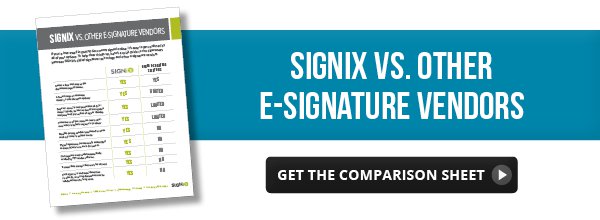
In our digital society, many of us rely on the Internet for record keeping. Think about the last time you used a credit card to fill your car with gas. Chances are you didn't take the paper receipt—or you threw it away because you didn't want to add more paper clutter to your life (or your car). Most of us don’t mind forgoing this physical proof-of-purchase because we know that evidence of our purchase will be in our electronic bank statement.
But in the world of e-signatures, evidence can’t be something you assume will be online when you need it, because not all e-signatures are the same.
Independent Evidence
Independent e-signatures and their cryptographic information (the data used to verify the e-signature) are embedded in signed documents. The evidence of the signature is permanent and can be verified with any free PDF reader software without an Internet connection. Because of this, you’re given complete ownership and control over your signatures and documents. You can store documents on your servers, with no ties to any outside party. You own all of the evidence supporting your e-signatures.
The evidence is also completely transparent – you don’t rely on back-up information inside a vendor's “black box.” You have a complete set of evidence from the first signature to the last.
Longevity of evidence is another benefit of independent e-signature. Evidence can be valid for decades because independent e-signatures are based on international, published standards, not internal proprietary standards. Standards that are widely published can always be referenced, no matter how technology evolves in the future.
All of these components strengthen the security of your e-signatures:
- Ownership and control reduce the risk of outside parties sabotaging an e-signature’s validity.
- Complete access to e-signature evidence reduces the risk of unknown or hidden factors making an e-signature invalid.
- Adherence to international standards reduces the risk of unforeseen external factors affecting an e-signature’s validity.
Dependent Evidence
In comparison, dependent e-signatures link back to the e-signature vendor for verification. If a link breaks or a disaster occurs, poof! You’ve lost the evidence of your e-signature’s validity. Not only are you dependent on a third party, but dependent e-signatures also can’t be verified offline, which compromises one of the key benefits of e-signature technology—convenience.
Dependent e-signatures are also often tied to proprietary standards, which may work for your vendor at this point in time, but are not guaranteed to work in the future. And, since these standards are hidden, there is no way to access them without the vendor’s assistance. Even then, dependent e-signature vendors can decide how much information to share, so you may not have access to all the evidence you need.
Why Should I Care?
E-signature evidence is vital for transactions to be legally sound today and tomorrow. This is especially important for highly-regulated industries like finance, healthcare and government that place a heavy emphasis on transparency and published standards.
In addition, many e-signature-based transactions, like mortgage loans, must remain valid 15, 20 or 30 years into the future. Because of this, it's important to know about any factors that might affect your e-signature’s validity over the long-term.
Are you getting the independent evidence you need for your e-signatures? To make sure, ask your vendor:
- Is the evidence behind each e-signature part of the document?
- Can the e-signatures’ evidence be seen with free document viewing software?
- Can the e-signatures be validated without going back to the vendor that produced them?
- Can the e-signatures be validated offline?
- Do the e-signatures comply with international cryptographic standards?
Want to learn what sets SIGNiX independent e-signature technology apart from other e-signature vendors? Download our comparison sheet.
%20formatted-1.png?width=2528&height=739&name=SIGNiX%20Logo%20Main%20(white)%20formatted-1.png)


